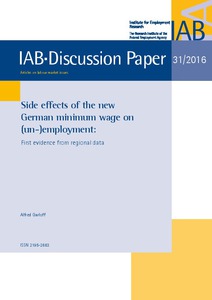Side effects of the new German minimum wage on (un-)employment - First evidence from regional data

Institut für Arbeitsmarkt- und Berufsforschung, Nürnberg
IAB - Nürnberg
2016
30 p.
employment ; labour market analysis ; minimum wage ; unemployment ; wage differential
IAB-Discussion Paper
31/2016
Wages and wage payment systems
English
Bibliogr.
"In Germany, decreasing collective bargaining coverage and rising wage inequality led to the introduction of a new statutory minimum wage of EURO 8.50 per hour of work. We analyze the relationship between the bite of the minimum wage and employment/ unemployment growth using regional data of the Federal Employment Agency for prime age individuals. We use difference-in-differences type of specifications using a panel of region-age-sex cells. The results do not provide evidence in favor of a reduced employment growth for the analysed groups, nor do they provide evidence for an increase in unemployment growth due to the minimum wage. However, we find an increase in growth of regular employment at the expense of marginal employment."
Digital
The ETUI is co-funded by the European Union. Views and opinions expressed are however those of the author(s) only and do not necessarily reflect those of the European Union or the ETUI.